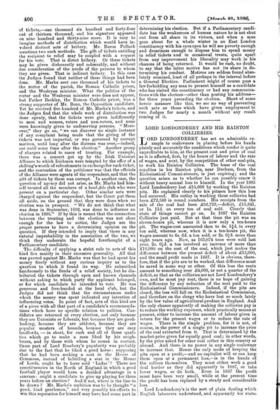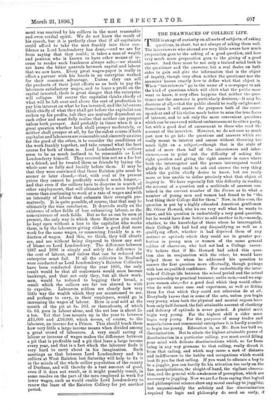LORD LONDONDERRY AND HIS RAINTON COLLIERIES. L ORD LONDONDERRY has set
an admirable ex- ample to coalowners in placing before his hands plainly and accurately the conditions which render it quite unprofitable to him, at the present cost and price of coal as it is affected, first, by the hours of labour and the rate of wages, and next, by the competition of other coal-pits, to work his Rainton Collieries. The lease of the coal royalties in his Rainton pits, near Durham, from the Ecclesiastical Commissioners, is just expiring; and the question arises as to whether be can possibly renew it without heavy annual loss to himself. In the year 1895 Lord Londonderry lost £15,000 by working the Rainton pits. He explained clearly to his pitmen how this lose had occurred. His outlay in working these collieries had been £72,580 in round numbers. His receipts from the sale of the coal had been X56,739,—deficit, £15,841, or is. 11d, on every ton of coal sold. Clearly that state of things cannot go on. In 1887 the Manton Collieries just paid. But at that time the pit was an eleven-hours pit, whereas it is now only a ten-hours pit. The wages-cost amounted then to 4s. 5id. in every ton sold, whereas now, when it is a ten-hours pit, the wages amount to 6s. 6d. a ton sold, or 2s. 0d. more than eight years ago. Now, as 163,074 tons were sold last year, 2s. old. a ton involved an increase of more than £16,000 on the cost of the coal, which just makes the difference between the present deficit of about £15,000, and the small profit made in 1887. It is obvious, there- fore, that if the pits are to be worked, that difference must be saved in some way or other. Of this loss the rents amount to something over £4,000, or not a quarter of the deficit, so that as the collieries are not Lord Londonderry's own, and he must pay rent, there is no hope of gaining the difference by any reduction of the rent paid to the Ecclesiastical Commissioners. Indeed, if the pits are closed, the loss will fall on the Ecclesiastical Commission, and therefore on the clergy who have lost so much lately by the low value of agricultural produce in England. And the only chance apparently of making the collieries pay is to reduce the working expenses, which practically means at present, either to increase the amount of labour given in return for the present wages or to reduce the rate of wages. There is the simple problem, for it is not, of course, in the power of a single pit to increase the price of the coal extracted from it. That is determined by the market-price given for equally good coal; in other words, by the price asked for other coal either in this country or abroad. And there is no power in any single coalowner to increase that. Hence the only mode of keeping the pits open at a profit,—and no capitalist will or can keep them open at a permanent loss,—is in the hands of the colliers themselves. They must either work a good deal harder as they did apparently in 1887, or take lower wages, or do both. Even in 1887 the profit must have been very small, while at the present time the profit has been replaced by a steady and considerable loss.
Lord Londonderry's is the sort of plain dealing which English labourers understand, and apparently his state- ment was received by his colliers in the most reasonable and even cordial spirit. We do not know the result of his speech, but it is perfectly clear that if all capitalists could afford to take the men frankly into their con- fidence as Lord Londonderry has done,—and we are far from saying that they could ; it takes a man of wealth and position who is known to have other means of in- come to render such frankness always safe,—we should not have the bitter quarrels between capital and labour that we now have. Every great wages-payer is really in effect a partner with his hands in an enterprise worked for their common advantage. Unless they can sell the products of their joint efforts so as both to pay the labourers satisfactory wages, and to leave a profit on the capital invested, there is great danger that the enterprise will collapse. Of course the capitalist thinks chiefly of what will be left over and above the cost of production to pay him interest on what he has invested, and the labourers think chiefly of what they shall get before the capitalist can reckon up his profits, but they are mutually dependent on each other and must fully realise that neither can prosper unless both prosper. And probably in times when it is a great question whether both shall prosper moderately, or neither shall prosper at all, by far the safest course if both capitalist and labourers are reasonable and sincerely anxious for the good of the other, is to consider the conditions of the work frankly together, and take counsel what the best course for both of them is. Lord Londonderry's colliers seem to be as much inclined to be reasonable as lord Londonderry himself. They received him not as a foe but as a friend, and he treated them as friends by laying the whole case so fully and lucidly before them. It may be that they were convinced that these Rainton pits must be sooner or later closed,—that, with coal at its present prices they cannot be profitably worked much longer,— and that even if the colliers have to disperse in search of other employment, that will ultimately be a more hopeful course than continuing to work at a rate of wages and with an intensity of labour that exhausts their strength pre- maturely. It is quite possible, of course, that that may be ultimately the wise conclusion. It depends really on the existence of other fields of less exhausting labour, or the non-existence of such fields. But so far as can be seen at present, the only way in which these Rainton pits could be kept open without a loss to the capitalist who works them, is by the labourers giving either a good deal more work for the same wages, or consenting frankly to a re- duction of wages. And this, we think, they will clearly see, and see without being disposed to throw any sort of blame on Lord Londonderry. The difference between 1887 and 1896 is simply and solely the difference in the cost of labour, and unless that can be reduced the enterprise must fail. If all the collieries in England were conducted as Lord Londonderry's Rainton Collieries have been conducted during the year 1895, the only result would be that all coalowners would soon become bankrupt, and that not only they, but all their work- men, would be reduced to begging their bread, a result which the colliers are far too shrewd to wish to expedite. Labourers seldom see clearly how very little way the wealth which they are accustomed to see, and perhaps to envy, in their employers, would go in increasing the wages of labour. Here is coal sold at the month of the pit at 8s. 10(1. or thereabouts, of which 6s. 6d. goes in labour alone, and the net loss is about 2s. a ton. Yet that loss mounts up in the year to between £15,000 and .Z16,000, which seems, of course, to the labourer, an income for a Prince. This should teach them how very little a large income means when divided among a great crowd of labourers. A very small saving of labour or increase of wages makes the difference between a pit that is profitable and a pit that loses a large income every year, and that is a fact which the labourer finds it very hard to carry about in his imagination. Such meetings as that between Lord Londonderry and his colliers at West Rainton last Saturday will help to fix it in the minds of the whole collier population of the county of Durham, and will thereby do a vast amount of good, even if it does not result, as it might possibly result, in some resolve on the part of the men employed to work for lower wages, such as would enable Lord Londonderry to renew the lease of the Balaton Colliery for yet another period.







































 Previous page
Previous page